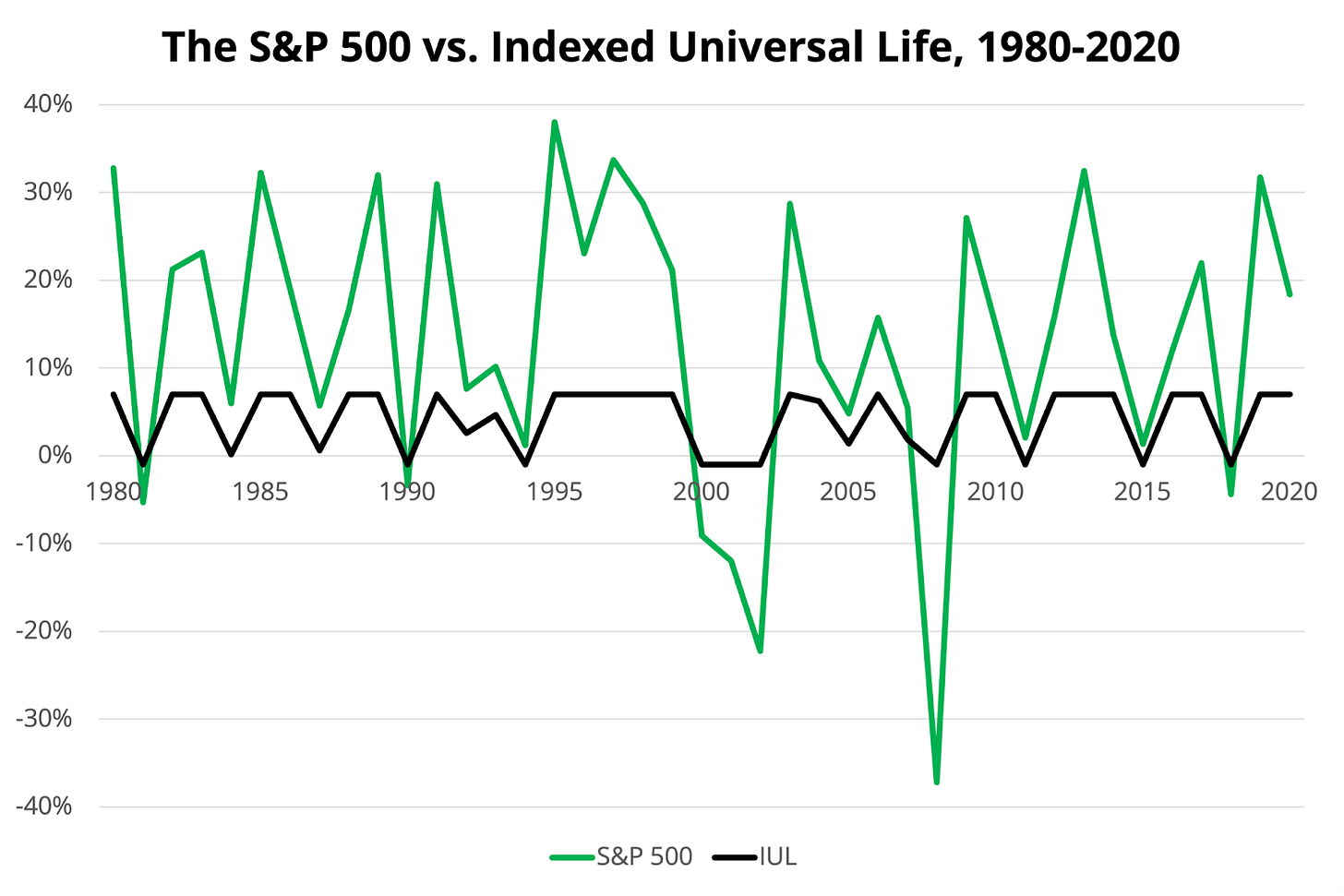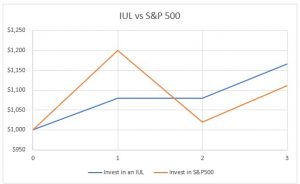All Categories
Featured
Table of Contents
1), commonly in an attempt to beat their classification averages. This is a straw man argument, and one IUL individuals love to make. Do they contrast the IUL to something like the Lead Total Stock Exchange Fund Admiral Shares with no lots, an expenditure ratio (EMERGENCY ROOM) of 5 basis factors, a turnover proportion of 4.3%, and a remarkable tax-efficient document of circulations? No, they compare it to some terrible proactively taken care of fund with an 8% load, a 2% ER, an 80% turnover ratio, and a horrible document of temporary capital gain circulations.
Common funds commonly make annual taxed distributions to fund owners, even when the value of their fund has decreased in value. Shared funds not just need earnings reporting (and the resulting yearly taxation) when the common fund is increasing in worth, but can also impose earnings tax obligations in a year when the fund has actually gone down in worth.
You can tax-manage the fund, gathering losses and gains in order to minimize taxable distributions to the financiers, but that isn't somehow going to change the reported return of the fund. The possession of shared funds might need the shared fund owner to pay projected taxes (term life vs universal life insurance).

IULs are simple to place so that, at the owner's fatality, the recipient is exempt to either earnings or estate tax obligations. The very same tax decrease techniques do not work almost too with common funds. There are various, typically pricey, tax traps connected with the timed trading of common fund shares, traps that do not relate to indexed life insurance policy.
Opportunities aren't extremely high that you're mosting likely to go through the AMT as a result of your mutual fund distributions if you aren't without them. The rest of this one is half-truths at ideal. While it is real that there is no earnings tax obligation due to your beneficiaries when they inherit the earnings of your IUL policy, it is additionally true that there is no revenue tax due to your successors when they acquire a common fund in a taxed account from you.
Iul Vs Roth Ira
There are much better means to stay clear of estate tax problems than purchasing investments with reduced returns. Mutual funds might trigger revenue tax of Social Safety and security benefits.

The development within the IUL is tax-deferred and may be taken as free of tax income through car loans. The plan proprietor (vs. the common fund manager) is in control of his/her reportable revenue, hence enabling them to minimize or perhaps eliminate the tax of their Social Safety advantages. This is wonderful.
Right here's an additional very little problem. It's true if you acquire a mutual fund for say $10 per share prior to the distribution date, and it disperses a $0.50 distribution, you are after that going to owe taxes (probably 7-10 cents per share) although that you have not yet had any type of gains.
However ultimately, it's really regarding the after-tax return, not just how much you pay in taxes. You are going to pay more in taxes by utilizing a taxable account than if you buy life insurance policy. You're also possibly going to have more cash after paying those tax obligations. The record-keeping needs for having shared funds are dramatically much more intricate.
With an IUL, one's records are kept by the insurance business, duplicates of annual declarations are sent by mail to the proprietor, and circulations (if any type of) are amounted to and reported at year end. This is likewise sort of silly. Naturally you need to keep your tax obligation records in case of an audit.
Universal Life Insurance Rates
All you have to do is push the paper right into your tax folder when it turns up in the mail. Rarely a factor to buy life insurance policy. It resembles this guy has never ever bought a taxable account or something. Shared funds are typically component of a decedent's probated estate.
Additionally, they are subject to the delays and expenditures of probate. The proceeds of the IUL plan, on the various other hand, is constantly a non-probate circulation that passes beyond probate directly to one's called recipients, and is as a result exempt to one's posthumous financial institutions, unwanted public disclosure, or similar hold-ups and expenses.
Medicaid incompetency and life time earnings. An IUL can supply their proprietors with a stream of income for their whole lifetime, regardless of just how long they live.
:max_bytes(150000):strip_icc()/dotdash-comparing-iul-insurance-iras-and-401ks-Final-71f14693e37d4fb1b0736112179802b5.jpg)
This is helpful when arranging one's events, and converting assets to revenue before a retirement home arrest. Shared funds can not be transformed in a similar way, and are virtually constantly considered countable Medicaid assets. This is an additional stupid one supporting that inadequate individuals (you recognize, the ones who need Medicaid, a government program for the bad, to pay for their assisted living home) need to utilize IUL rather than common funds.
Universal Aseguranza
And life insurance policy looks horrible when compared rather versus a retirement account. Second, individuals that have money to acquire IUL above and past their pension are going to need to be terrible at managing cash in order to ever receive Medicaid to spend for their assisted living facility costs.
Persistent and terminal disease biker. All plans will certainly enable a proprietor's simple access to money from their policy, often forgoing any kind of surrender charges when such individuals endure a serious disease, require at-home care, or come to be constrained to a nursing home. Common funds do not supply a similar waiver when contingent deferred sales costs still relate to a common fund account whose owner needs to sell some shares to money the expenses of such a remain.
Indexed Universal Life Insurance Reviews
You get to pay even more for that advantage (biker) with an insurance coverage plan. What a fantastic bargain! Indexed global life insurance policy gives fatality advantages to the beneficiaries of the IUL proprietors, and neither the owner nor the beneficiary can ever shed money because of a down market. Mutual funds offer no such guarantees or survivor benefit of any type of kind.
I definitely do not need one after I reach economic freedom. Do I want one? On average, a purchaser of life insurance pays for the true price of the life insurance policy advantage, plus the costs of the plan, plus the earnings of the insurance policy firm.
Indexed Universal Life Pros And Cons
I'm not completely certain why Mr. Morais included the entire "you can't lose money" once more below as it was covered quite well in # 1. He simply wished to repeat the best marketing factor for these points I suppose. Once more, you do not shed nominal bucks, but you can lose genuine dollars, in addition to face significant chance price because of low returns.

An indexed universal life insurance policy plan proprietor might exchange their policy for a completely various policy without setting off earnings taxes. A common fund proprietor can not move funds from one common fund business to an additional without selling his shares at the previous (thus activating a taxed event), and repurchasing brand-new shares at the latter, commonly based on sales fees at both.
While it is real that you can exchange one insurance coverage for one more, the reason that people do this is that the first one is such a dreadful plan that even after getting a brand-new one and experiencing the early, adverse return years, you'll still come out in advance. If they were marketed the appropriate plan the very first time, they shouldn't have any type of need to ever trade it and go via the very early, adverse return years once more.
Latest Posts
Universal Life Vs Term Insurance
Iul Insurance For Retirement
Adjustable Life Insurance Vs Universal Life Insurance